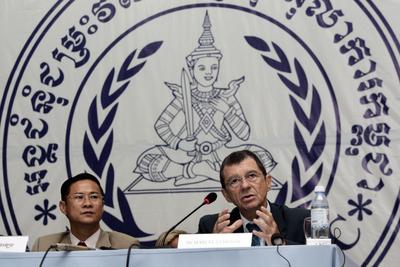A coherent body of private law — the law that empowers citizens in their daily lives by establishing their rights and obligations to each other in their personal transactions — had been largely lacking, and was scattered among ad hoc Decree Laws.
The new Civil Code fills this gap, providing a classic civil-law framework for the major forms of private law: the laws of persons, property and obligations. Contracts for sale, lease, employment, unjust enrichment and torts are singled out for special treatment, as are secured transactions. The laws of marriage and family, and of succession, are dealt with in detail. Civil relationships are, for the first time in recent history, clearly defined in terms of obligations and rights.
Despite these advances, three major hurdles remain to be overcome before Cambodians and their contractual partners can be assured that their legal affairs will be reasonably, consistently and transparently dealt with by the government and the courts. First, potential conflicts between the pre-existing and often not-repealed Decree Laws must be resolved. Although the Civil Code has attempted in some articles to specify whether new provisions in the Civil Code will take precedence over the older and more specific Decree Laws, there remain many points of law that are still in doubt.
Second, the regulatory structure for the implementation of the new code must be created. The provisions of the Civil Code are often not self-executing, particularly in the areas of real property transactions, including transfer of and title to land, and registration of business entities.
Third, the government personnel who will be charged with implementing the new code provisions must be trained. Judges, court clerks, lawyers and ministry personnel will all need to be knowledgeable about the substance of the new code provisions and the regulations that will be drafted to implement them.
Minor critiques may also be levied against particular provisions of the code. For example, a judge may refuse to grant a divorce when only one spouse, rather than both, requests it. This provision confers excessive discretion on the judiciary, and it will almost certainly be abused to the detriment of men and women seeking to establish new lives for themselves — many of whom may be seeking to escape violent or abusive marriages. Likewise, a provision that enforceable contracts for division of marital property must be in writing ignores the reality that in the Cambodian countryside many citizens are illiterate.
But on the whole, the code is a major step forward for Cambodia. It is a cosmopolitan, internationalist document, exhibiting the influence of pre-existing Cambodian law as well as that of Japanese and French law. One knowledgeable Cambodian observer even sees common-law influence in the section of the code dealing with the basic rules of contract. The presence of Japanese and French concepts is not surprising, as the drafting of the code was a joint project of Japan and Cambodia, and France is the former colonial power in Cambodia. The presence of common-law concepts is a bit more remarkable, but no doubt is due to the active participation of Australia and the US in the reconstruction of the Cambodian legal system. In short, the new code is a healthy hybrid which should serve Cambodia well. It promises far greater security under the rule of law than the Cambodian people have previously known.
Dolores A. Donovan is Professor at the School of Law, University of San Francisco.
The author acknowledges the valuable contributions to this piece provided by Koy Neam and Run Saray.

